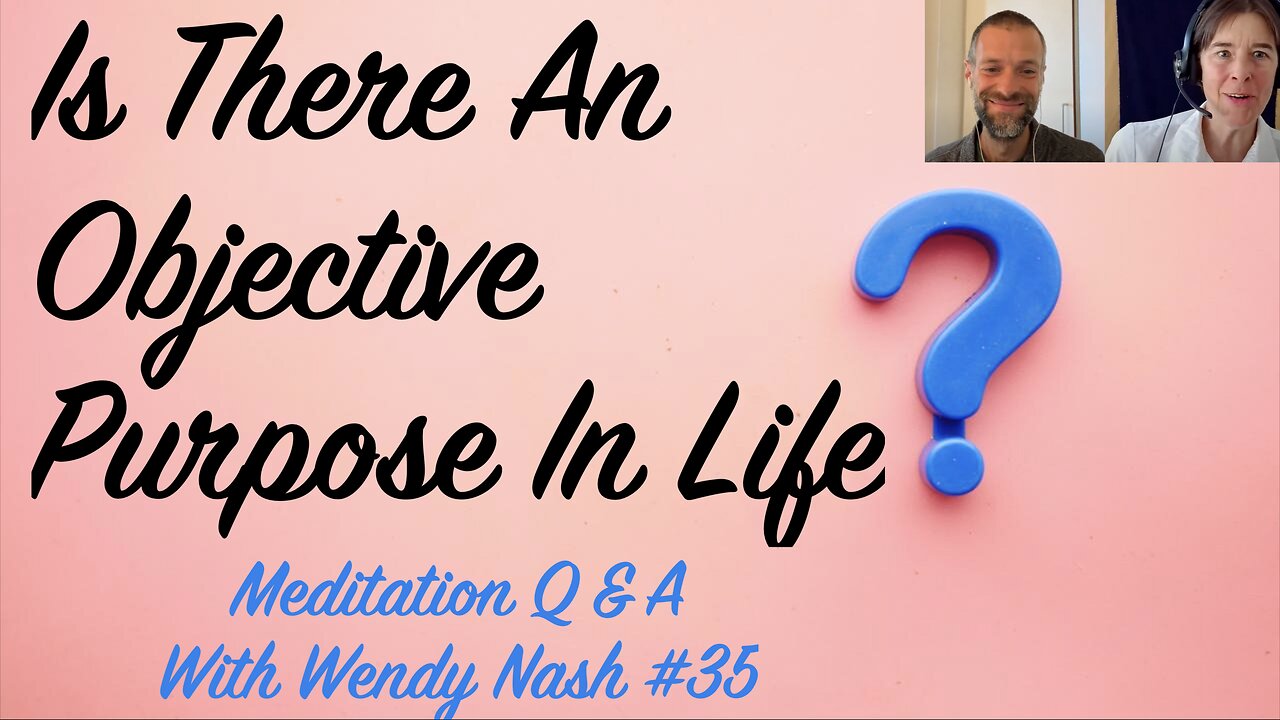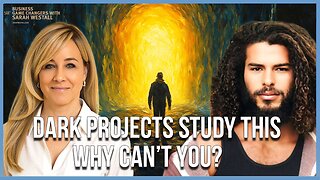Premium Only Content

Is There An Objective Purpose In Life? | “Meditation Q & A With Wendy Nash” #35
In this thirty-fifth installment of the ongoing live series with Wendy Nash inquiring into meditation practice on and off the cushion we delve into this question from user "xXHishamXx" we received at the end of last month's session: "Is There An Objective Purpose In Life?" including relevance to meditation practice.
0:00 - Introduction and Series Kickoff
0:05 - Wendy’s Arrival and Light Banter
0:24 - Wendy’s Personal Update
0:43 - Community Engagement via App
1:23 - Josh’s Experience with Neighborhood Apps
2:24 - App Functionality and Community Improvement
3:50 - Light-Hearted Tangent on Drones and Aliens
4:50 - Introducing the Purpose of Life Question
6:26 - Wendy on Purpose and Ego
8:17 - Existential Reflections and Buddhist Perspective
11:04 - Purpose, Suffering, and Meditation
14:28 - Community, Meaning, and Social Structures
17:13 - Belonging and Societal Shifts
21:32 - Meditation, Service, and Intent
26:14 - Cultural Sensitivity and Privilege
35:37 - Accountability and Community Engagement
41:24 - Relationality and Context in Purpose
46:06 - Learning, Meditation, and Purpose
50:25 - Motivations and the Drama Triangle
56:50 - Wrapping Up: Purpose in Meditation and Life
My short answer is answering it with what the Buddha taught: dukkha and the end of dukkha or suffering and the end of suffering.
We also mention neighborhood apps and community engagement; give existential reflections that include Buddhist principles and personal anecdotes; the role of ego; the importance of community and belonging vs individualism; cultural sensitivity in service (especially regarding indigenous communities); how meditation fosters clarity, kindness, and skillful intentions; we caution against unskillful motivations like revenge or the "drama triangle" while emphasizing relationality, humility, and learning as pathways to meaning. We end inviting consideration that life's purpose can be reflected upon in this very existence and in our relational interactions.
I forgot to mention a few things like the potential dangers of gamifying life. If we look at everything in life through the googles of game theory as merely games to be won we open can after can of nasty worms, vomit, excrement, etc. How much of a winner or loser will one be on one's death bed? How much will past wins and losses matter then? Discarding winning and losing, and being calm, and being wise is the alternative:
'Victory breeds hatred,
The defeated live in pain.
The wise one, discarding both victory and defeat,
Lives in happiness.'
~ Dhammapada verse 201
There's also the dangers of falling into the extremes of eternalism and/or nihilism when considering the purpose of life. There's potentially a lot to mention so I'll just boil part of it down to when there's an overemphasis on wisdom and/or moving away from the heart and pushing and pushing this to the extreme one could then get into nihilistic tendencies which are not beneficial for oneself and others -- even in the long term. You'll have to investigate, reflect and contemplate this for yourself as I'm not going to unpack it now.
Conversely, those giving too much emphasis on certain aspects -- especially certain heart qualities -- without wisdom seem to be more prone to falling into eternalism which can be a trap on the other end of the spectrum from nihilism. It goes like this: What if you want to get off the wheel of foreverness of the eternal? Well too bad because you can't because you go on forever and there's no option or choice to do otherwise.
So what would then be the point, especially of being urgent about anything? What would any one action really matter given its place in the vast amount of time of foreverness with no way off or no way out? Do you see how these extremes can even feed on each other? These are just a few reasons I can see why the Buddha advised against them.
Another high water mark is that existence and non-existence are not even really relevant when it comes to the point of "spirituality". Of this quadlemma the Buddha (here Tathagata) expounds:
'Vacchagotta, the position that ‘the Tathagata exists after death,’ does not apply; ‘the Tathagata does not exist after death,’ does not apply; ‘the Tathagata both exists and does not exist after death,’ does not apply; ‘the Tathagata neither exists nor does not exist after death,’ does not apply. This is because the Tathagata, having abandoned all physical and mental aggregates, is deep, immeasurable, hard to fathom, like the great ocean.' ~ Majjhima Nikaya 72
To wrap up there's the drama triangle podcast episode I mentioned https://veilofreality.com/2025/08/24/how-to-move-from-victimhood-to-empowerment-tcm-160-part-1
and a somewhat related 50 some part series Awaking from the Meaning Crisis: https://www.youtube.com/playlist?list=PLND1JCRq8Vuh3f0P5qjrSdb5eC1ZfZwWJ
Original blog post: https://integratingpresence.com/2025/09/21/is-there-an-objective-purpose-in-life-meditation-q-amp-a-with-wendy-nash-35/
-
 2:34:03
2:34:03
PandaSub2000
4 days agoLIVE 10:30pm ET | CARMEN SANDIEGO
27.1K1 -
 12:10
12:10
Robbi On The Record
1 day ago $5.10 earnedKarmic Disclosure and Predictive Programming
32K4 -
 4:57
4:57
Gamazda
6 hours ago $5.83 earnedAerosmith - Dream On (Piano by Gamazda)
25.2K13 -
 8:12
8:12
Freedom Frontline
9 hours agoChip Roy DESTROYS Democrat After She Explodes Over Shutdown Truth
14.1K4 -
 2:29:50
2:29:50
We Like Shooting
18 hours ago $3.05 earnedWe Like Shooting 638 (Gun Podcast)
12.6K -
 46:09
46:09
MattMorseTV
7 hours ago $24.68 earned🔴Bondi just DROPPED the BALL... BIG TIME.🔴
25.7K135 -
 23:57
23:57
Jasmin Laine
10 hours agoCarney SNAPS at Reporters—MOCKS Trump and it BACKFIRES IMMEDIATELY
18.3K44 -
 1:04:42
1:04:42
Sarah Westall
7 hours agoDo Near Death Experiences Provide a Glimpse into Reality? w/ Darius Wright
16.6K1 -
 49:36
49:36
Barry Cunningham
8 hours agoMUST SEE: PAM BONDI AND KAROLINE LEAVITT MAKE REMARKS! | AND MORE NEWS!
110K38 -
 41:11
41:11
Donald Trump Jr.
1 day agoMaking America Affordable Again, Interview with Economist Steve Moore | TRIGGERED Ep.294
133K113